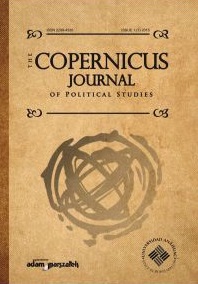The Impact of Having Children on Party Member Activism
DOI:
https://doi.org/10.12775/cjps.2014.01.05Słowa kluczowe
Party membership, party organization, gender differences, political participation, familyAbstrakt
Party member activism varies in type and intensity, and it is necessary to take this into consideration when explaining the degree of participation. One potential explanation for the level of party member participation is the extent to which there are children in the household. Based on the Danish party member survey of 2012, analyses show: First, the cost of having children is more important when explaining more demanding activities than the less demanding activities, and, second, the impact of the cost of having children in the household is larger when including the intensity of participation in the dependent variable. Third, the smaller the children, the larger the cost and the larger the negative impact on party activism no matter what type or intensity. Furthermore, there are only limited gender differences in the impact of having children so that children, in particular in the young age group, do not have a larger impact on women than men, except when it comes to meeting attendance. In sum, children do have an impact on party member activism, and the gender gap in this effect is very limited.
Bibliografia
van Biezen, I., Mair, P. & Poguntke, T. (2012). Going, going, … gone? The decline of party membership in contemporary Europe. European Journal of Political Research, 51, pp. 24 –56.
Hansen, B. (2002). Party Activism in Denmark. Aarhus: Politica.
Heidar, K. (1994). The polymorphic nature of party membership. European Journal of Political Research, 25, pp. 61–86.
Heidar, K. & Saglie, J. (2002). Hva skjer med partiene? Oslo: Gyldendal Akademisk.
Katz, R. S., Mair, P., Bardi, L., Bille, L., Deschouwer, K., Farrell, D., Koole, R., Morlino, L.Müller, W., Pierre, J., Poguntke, T., Sundberg, J., Svasand, L., Velde, H. v. d., Webb, P. & Widfeldt, A. (1992). The membership of political parties in European democracies, 1960–1990. European Journal of Political Research, 22(3), pp. 329–345.
Mair, P. & van Biezen, I. (2001). Party Membership in Twenty European Democracies, 1980–2000. Party Politics, 7(1), pp. 5–21.
Panebianco, A. (1988). Political parties: Organization and power. Cambridge: Cambridge University Press.
Petersson, O., Westholm, A. & Blomberg, G. (1989). Medborgarnas Makt. Stockholm: Carlsson Bokförlag.
Scarrow, S.E. (1996). Parties and their Members. Organizing for Victory in Britain and Germany. Oxford: Oxford University Press.
Scarrow, S.E. (2000). Parties without Members? Party Organization in a Changing Electoral Environment. In R. J. D. Dalton & M. P. Wattenberg (Ed.), Parties without Partisans. Political Change in Advanced Industrial Democracies (pp. 95–96). Oxford:Oxford University Press.
Selle, P. & Svasand, L. (1991). Membership in Party Organizations and the Problem of Decline of Parties. Comparative Political Studies, 23(4), pp. 459–77.
Seyd, P. & Whiteley, P. (1992). Labour’s Grass Roots. The Politics of Party Membership. Oxford: Clarendon Press.
Seyd, P. & Whiteley, P. (2002). New Labour’s Grassroots. The Transformation of the Labour Party Membership. Basingstoke: Palgrave Macmillan.
Weldon, S. (2006). Downsize My Polity? The Impact of Size on Party Membership and Member Activism. Party Politics, 12(4), pp. 467–481.
Whiteley, P. & Seyd, P. (1998). The Dynamics of Party Activism in Britain: A Spiral of Demobilization? British Journal of Political Science, 28(1), pp. 113–137.
Whiteley, P., Seyd, P. & Richardson, J. (1994). True Blues – The Politics of Conservative Party Membership. Oxford: Clarendon Press.
Widfeldt, A. (1997). Linking Parties with People? Party Membership in Sweden 1960–1994. Göteborg: Göteborg University.
Pobrania
Opublikowane
Jak cytować
Numer
Dział
Statystyki
Liczba wyświetleń i pobrań: 401
Liczba cytowań: 0



